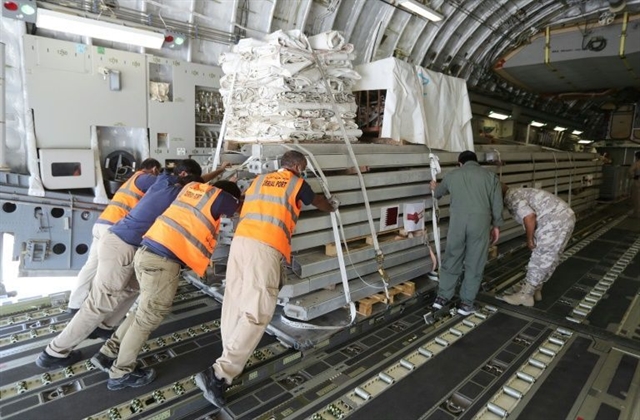 World
World


|
| Workers in Qatar load a field hospital onto a flight to Beiruit to help Lebanon treat the more than 4,000 injured people on Tuesday's monster blast. — AFP/VNA Photo |
BEIRUT — Countries dispatched emergency medical aid, pop-up field hospitals, rescue experts and tracking dogs to Lebanon on Wednesday as the world reacted to the vast explosion that devastated Beirut.
The blast centred on the city's port caused massive destruction and killed at least 113 people, heaping misery on a country already in crisis.
Gulf states were among the first to respond, with Qatar sending mobile hospitals to ease pressure on Lebanon's medical system, already strained by the coronavirus pandemic.
A Qatari air force plane delivered hundreds of collapsible beds, generators and burn sheets in the first of a convoy of flights to Beirut.
Kuwait also sent medical supplies as the Lebanese Red Cross said more than 4,000 people were being treated for injuries after the explosion, which sent glass shards and debris flying.
A Greek C-130 army transport plane bearing a dozen rescuers landed at Beirut's airport, itself damaged in the catastrophic explosion.
Lebanon's Prime Minister Hassan Diab has called on "friendly countries" to support a nation already reeling from its worst economic crisis in decades as well as a coronavirus outbreak that has infected over 5,000 people and killed 68.
As emergency crews hauled survivors from the rubble of demolished buildings, France said it was sending search and rescue experts aboard three military planes loaded with a mobile clinic and tonnes of medical and sanitary supplies.
President Emmanuel Macron is to travel to Lebanon on Thursday, the first world leader to do so after the disaster, as France seeks to swiftly push reconstruction in its former colony.
"France is at the side of Lebanon. Always," Macron tweeted in Arabic.
Prosecutors in France also opened an investigation into the blast, which wounded 21 French citizens.
Queen 'deeply saddened'
Britain's Queen Elizabeth II sent a message of condolence to the president of Lebanon, saying she was "deeply saddened" by the blast.
US Secretary of State Mike Pompeo, in a phone call with Diab, offered Washington's assistance and stressed "our solidarity with and support for the Lebanese people as they strive for the dignity, prosperity and security they deserve".
Cyprus, just 240 kilometres away and close enough for residents to see and hear the blast, said it was sending eight police tracking dogs and their handlers aboard two helicopters to help in the search for victims trapped under rubble.
From Europe, authorities in the Netherlands, Czech Republic and Poland offered an array of assistance including doctors, police and firefighters, together with rescue experts and sniffer dogs.
Italy said it had sent 14 firefighters specialised in assessing chemical risks and damaged structures to provide technical support.
President Hassan Rouhani of Iran, itself battling the Middle East's deadliest coronavirus outbreak, said Tehran stood "ready to offer medical and medicinal aid and help treat the injured".
'Stay strong, Lebanon'
The World Health Organisation said it was sending trauma and surgical kits from its Dubai base after the "shocking event" that comes at a "particularly difficult time in Lebanon".
"Many hospitals are overwhelmed with casualties and people are still looking for the injured and the dead, so it's a very sad day," the UN agency's emergencies director Michael Ryan told an online session.
Unusually, neighbouring Israel offered humanitarian aid – to a country with which it is still technically at war – via international intermediaries.
In the coastal city of Tel Aviv, Lebanon's flag was projected onto the city hall on Wednesday evening. — AFP




